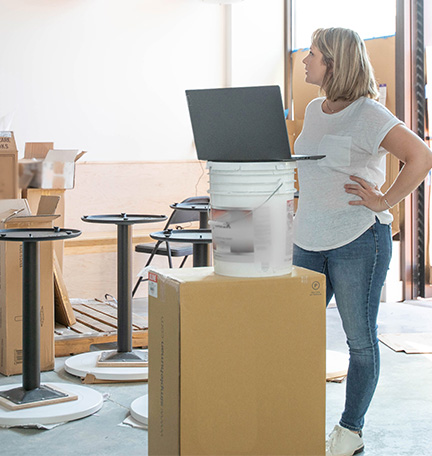Bigger isn't always better. Sometimes the best thing a business owner can do is choose to stay small.
Just because you're small doesn't mean you're small-time. There's a host of reasons why a small business owner might make the decision not to grow. Just be sure to use your size to your advantage so you can run a small business that's profitable and sustainable.
Your bottom line
A bigger company doesn't always come with increased profitability. Before scaling your business or accepting a business growth opportunity, take a hard look at the financial investment needed to achieve those goals.
Your happiness
When your business grows, you're often forced to take on additional tasks that may leave less time for doing what you're passionate about – or good at. And a bigger business often requires a bigger time investment, so consider your work/life balance and personal goals – not just your career ambitions.
Your employees
"When companies grow, they have to expand their base of associates, which creates a whole litany of talent-management issues, from recruiting to complexity around healthcare benefits and legal issues," says Ryan S. Goldberg, EVP, head of priority banking and branch small business at Regions Bank. Staying small allows you to handpick your team so you can find the right people for your business. Sometimes, it's also better for the employee!
"When there are only a few people to manage, a business owner can create relationships with each employee," says Aryana Jaleh, office manager at Eboxlab, a four-person IT support company in Denver, Colorado. "Every person feels valued not only because the owner cares, but because each carries a large portion of the company's business on his or her shoulders. While there is not a lot of room for internal growth, there are many opportunities for employees to take on new projects and roles and to expand the customer base."
Your customers
For many small businesses, exceptional customer service is a critical competitive differentiator. Their size allows them to provide clients with personalized, hands-on attention, and that becomes more challenging to provide when a company grows.
"Since we are a boutique firm, our clients are used to getting the best of care. Due to our size, I, as CEO, am also able to be involved in the important aspects of each one of our accounts. This is a huge advantage for the clients," says Ayelet Noff, founder of Blonde2.0, a public relations agency. "We have turned down a few partnership/acquisition offers over the years because we felt that if we let this partner in, the company culture would be completely altered and our work processes would be disturbed."
Small business sustainability
You've made the decision to remain small, but you are still striving for long-term success. To make sure your small business is sustainable, surround yourself with the right advisory group. "Be sure you have a good banker, legal professional, insurance person and accountant—your cabinet, so to speak—so you can leverage their expertise," advises Goldberg.
You'll also need a plan for navigating unforeseen cash flow issues. "Whether this fallback funding is personal, a line of credit, or cash reserves within your business, you need to understand how you're going to keep your business going," says Goldberg.
Don't forget why you started your business in the first place. Most likely, you love what you do, and you love working with like-minded people. "We feel like a big family at work, and I love the people I am surrounded by," says Noff. "What else could I ask for? Why would I ever do anything to risk this just for the sake of growth? No one said that having more employees equals more success and revenue."











